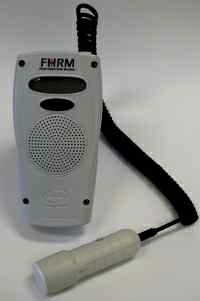|
Freeplay Energy, a firm with Cape Town roots has scooped a top design award for a device with the potential to save millions of babies' lives. The wind-up foetal heart rate monitor safeguards childbirth for infants and mothers in remote areas of the developing world where expert care and electrical power are in short supply. It was designed to work in rough rural conditions, and has a function for turning human energy into electricity – making it ideal for use in areas without a reliable electricity supply. This device is the brainchild of a retired Cape Town neonatologist, Professor Emeritus David Woods and his colleague Professor John Wyatt of University College, London. Together with Dr Joy Lawn of the South African Medical Research Council, this trio makes up the not-for-profit company Power-free Education and Technology (PET) that provided the clinical expertise in the project, and also develops and distributes free training material for medical staff in the developing world. Babies and mothers dying "The biggest problem is at district hospital level where 42% of the births occur, and where the percentage of avoidable causes is highest," says Lawn. "It is always tragic to see a beautifully grown infant who has made it safely through months of pregnancy only to die during the last few hours of labour," says Woods. "The challenge is to identify those infants that are becoming stressed during labour because of too little oxygen." With the use of the heart rate monitor doctors or midwives can keep track of the foetus' heart rate, and will immediately be alerted that it is not getting sufficient oxygen, and can then take the necessary action. "This promises to save the lives of thousands of infants and prevent brain damage in even more," says Woods. Challenges The problems with regular foetal heart rate monitors in rural areas are that the sensitive device often breaks in rough conditions, needs replacement batteries and there may be no reliable electricity supply to run the device. The R6,000-price tag is also an inhibiting factor in low-resource settings. "What we did was to bypass these barriers by developing a relatively inexpensive, robust monitor that can use a range of energy sources, including hand cranking," says Woods. "Now we can accurately and quickly identify a foetus in trouble during labour without the need for first world equipment." The wind-up foetal heart rate monitor is sold for around R2,750. It was tested in rural clinics in South Africa and by the international medical and humanitarian organisation, Médecins Sans Frontières (MSF), in the Philippines with very good responses. Future projects Click here to view a video on the wind-up foetal heart rate monitor. |




 Publications
Publications
 Partners
Partners















